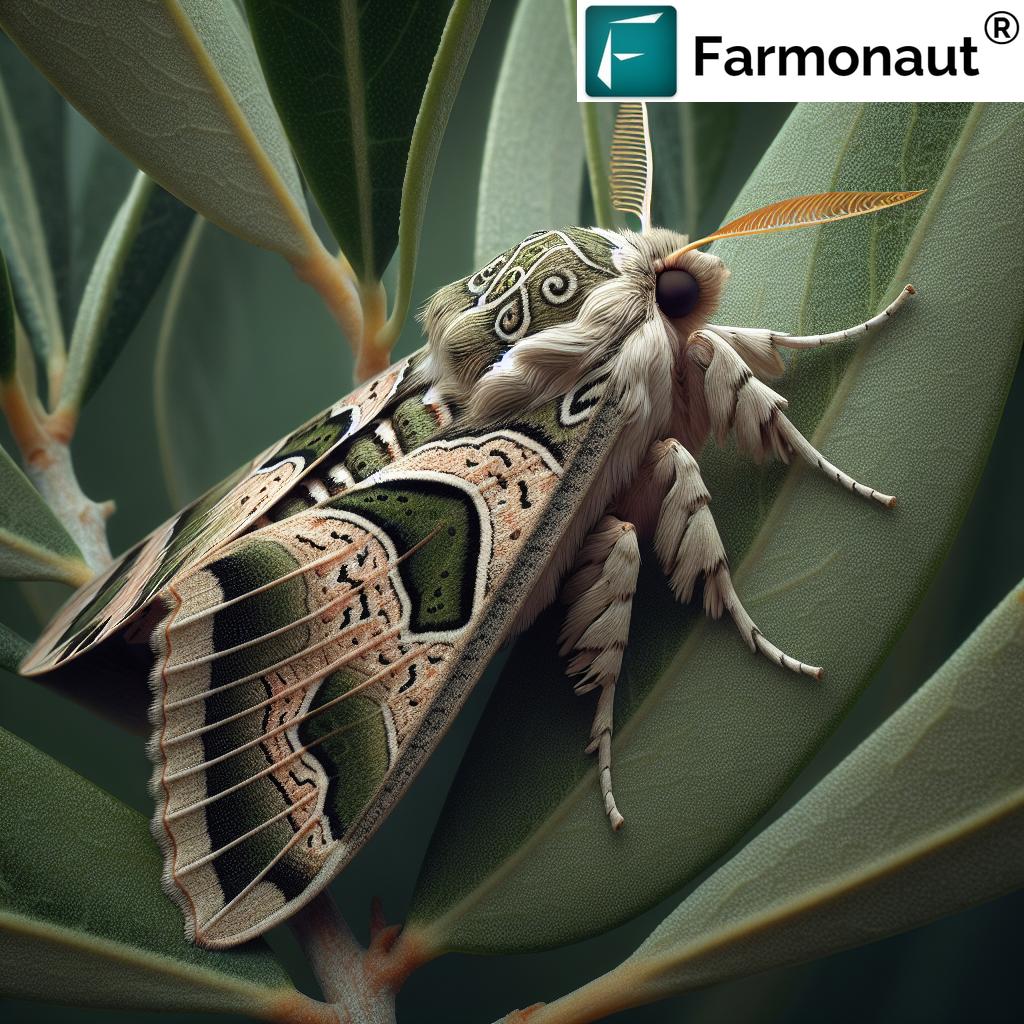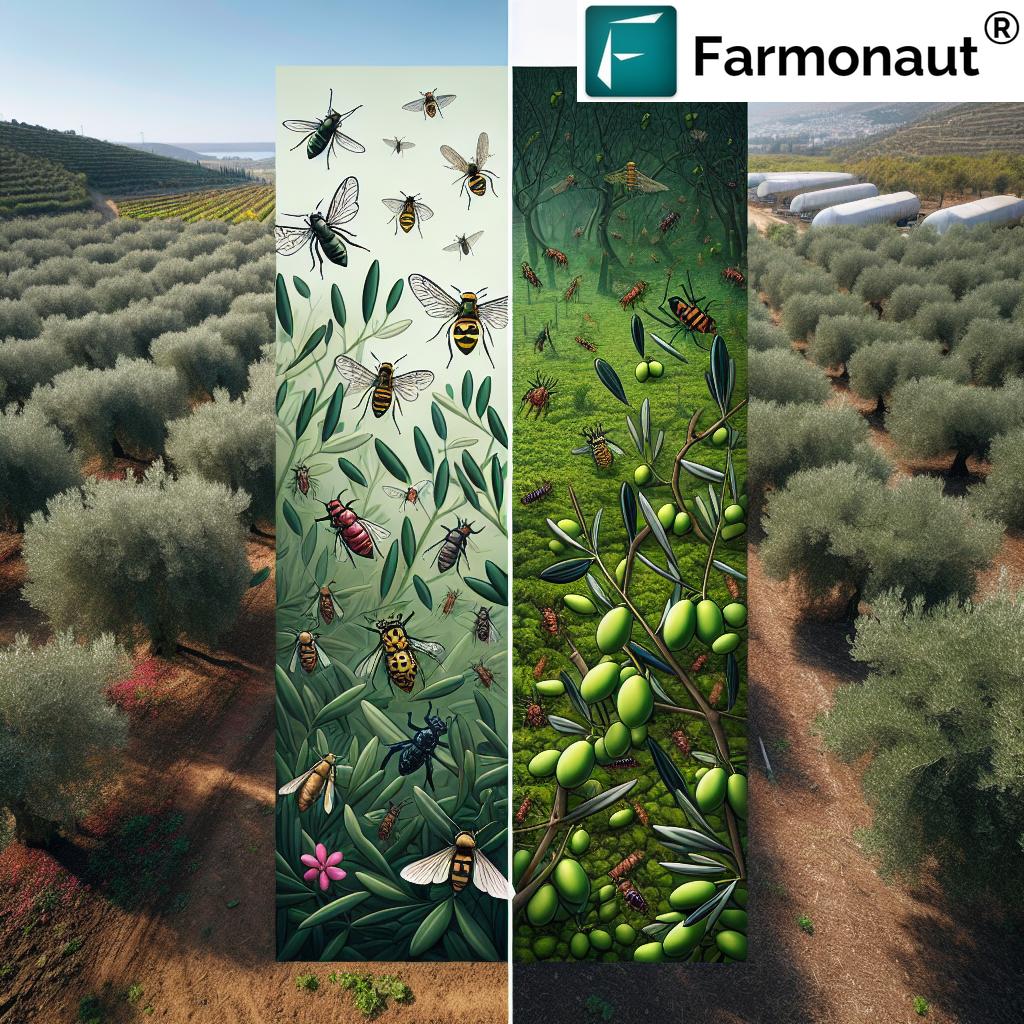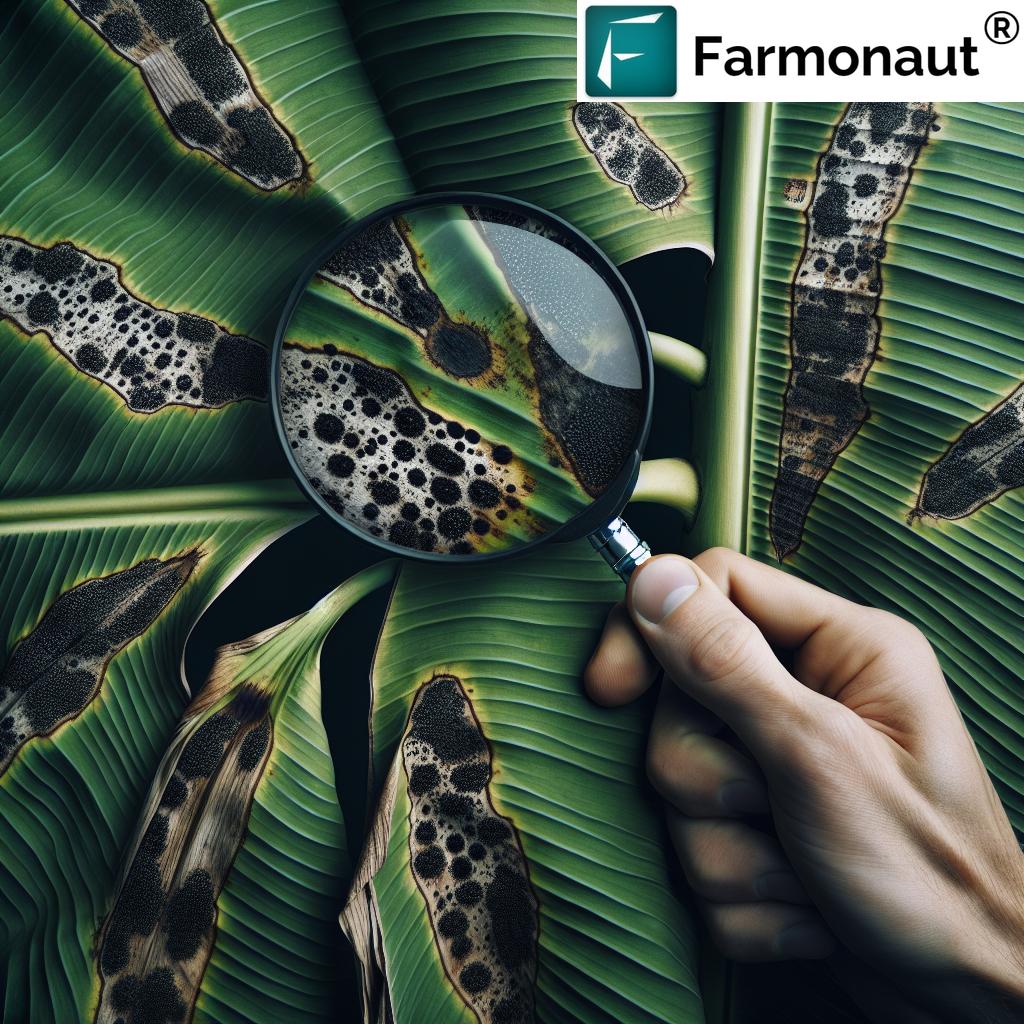Organic Pest Control: Protecting Jasmine and Olive Trees from Moth Infestations

In the world of agriculture and horticulture, maintaining the health and productivity of our precious crops is of utmost importance. At Farmonaut, we understand the challenges faced by farmers and orchard owners when it comes to pest control, particularly in the case of jasmine and olive trees. One of the most persistent threats to these valuable crops is the moth infestation. In this comprehensive guide, we’ll explore the various aspects of organic pest control methods to protect jasmine and olive trees from moth infestations, while also discussing the role of advanced technologies in modern agriculture.
Understanding Moth Infestations in Jasmine and Olive Trees
Before delving into control methods, it’s crucial to understand the nature of moth infestations in jasmine and olive trees. Several species of moths are known to target these plants, causing significant damage to leaves, foliage, and fruit.
Common Moth Species Affecting Jasmine and Olive Trees
- Margaronia (Palpita unionalis): Also known as the jasmine moth, this species primarily affects jasmine plants.
- Prays oleae: Commonly known as the olive moth, this species is a major pest in olive orchards.
- Palpita vitrealis: Another species that can affect both jasmine and olive trees.
These moths belong to the order Lepidoptera, which includes butterflies and moths. Understanding their life cycle is key to effective pest control.
Life Cycle of Moth Pests
- Eggs: Female moths lay eggs on the underside of leaves or in crevices of the plant.
- Larvae: Upon hatching, the larvae (caterpillars) begin feeding on the plant tissue.
- Pupae: After several molts, the larvae enter the pupal stage.
- Adult: The adult moths emerge, ready to mate and lay eggs, continuing the cycle.
The larvae stage is typically when the most significant damage occurs to the host plant.
The Impact of Moth Infestations on Jasmine and Olive Trees
Moth infestations can have severe consequences for both jasmine and olive crops:
- Reduced yield and quality of flowers (jasmine) or fruits (olives)
- Weakened plant health due to foliage damage
- Increased susceptibility to other pests and diseases
- Economic losses for farmers and orchard owners
Given these potential impacts, it’s crucial to implement effective pest control strategies. At Farmonaut, we advocate for organic and sustainable approaches to pest management.
Organic vs. Conventional Pest Control Methods
When it comes to protecting jasmine and olive trees from moth infestations, farmers have two main approaches: conventional (chemical-based) and organic pest control methods. Let’s compare these approaches:
| Aspect | Conventional Pest Control | Organic Pest Control | Farmonaut’s Contribution |
|---|---|---|---|
| Primary Methods | Chemical pesticides | Biological controls, cultural practices, natural repellents | Satellite monitoring for early detection and targeted treatment |
| Environmental Impact | Potential harm to beneficial insects and ecosystem | Minimal environmental impact | Supports sustainable agriculture practices |
| Long-term Effectiveness | May lead to pesticide resistance | Sustainable and long-lasting | Continuous monitoring enables adaptive management |
| Cost | Initially lower, but may increase over time | Higher initial investment, but cost-effective in the long run | Optimizes resource use, reducing overall costs |
| Safety for Consumers | Potential chemical residues on produce | No harmful residues, safer for consumption | Enhances traceability and food safety |
| Monitoring and Management | Often reactive, based on visible damage | Proactive, relies on careful observation | Real-time satellite data enables proactive pest management |
As we can see, organic pest control methods offer numerous benefits, particularly in terms of environmental sustainability and long-term effectiveness. At Farmonaut, we believe that integrating advanced technologies with organic pest control strategies can yield the best results for farmers and the environment.
Organic Pest Control Strategies for Moth Infestations
Let’s explore some effective organic pest control methods for protecting jasmine and olive trees from moth infestations:
1. Biological Control
Biological control involves using natural predators or parasites of the pest species to keep their populations in check. For moth control in jasmine and olive trees, consider the following options:
- Trichogramma wasps: These tiny wasps lay their eggs inside moth eggs, preventing them from hatching.
- Bacillus thuringiensis (Bt): A naturally occurring bacteria that produces proteins toxic to certain insect larvae, including many moth species.
- Predatory insects: Encourage beneficial insects like ladybugs, lacewings, and praying mantises that feed on moth eggs and larvae.
2. Cultural Practices
Cultural practices involve modifying the growing environment to make it less favorable for pest development:
- Proper pruning: Regular pruning improves air circulation and reduces hiding spots for moths.
- Sanitation: Remove fallen leaves and debris that may harbor pests.
- Companion planting: Grow plants that repel moths or attract their natural predators.
- Crop rotation: For smaller plantings, rotate susceptible crops with non-host plants to break the pest lifecycle.
3. Physical Barriers
Creating physical barriers can prevent moths from accessing your jasmine or olive trees:
- Floating row covers: Light fabric covers that allow sunlight and water to pass through while keeping pests out.
- Sticky traps: Place these around the base of trees to capture adult moths before they can lay eggs.
- Pheromone traps: These attract and trap male moths, disrupting the mating cycle.
4. Natural Repellents and Organic Sprays
Several natural substances can repel or deter moths:
- Neem oil: A natural insecticide that disrupts the feeding and growth of moth larvae.
- Garlic spray: A homemade repellent made from crushed garlic and water.
- Essential oils: Certain essential oils like peppermint, lavender, and citronella can repel moths.
- Diatomaceous earth: A fine powder that damages the exoskeletons of insects, including moth larvae.
5. Monitoring and Early Detection
Regular monitoring is crucial for effective pest control. This is where Farmonaut’s advanced satellite monitoring technology comes into play. Our platform provides real-time data on crop health, allowing farmers to detect pest infestations early and take prompt action.
To learn more about how Farmonaut can help with early pest detection, visit our app or explore our API for integration with your existing systems.

Implementing an Integrated Pest Management (IPM) Approach
At Farmonaut, we recommend adopting an Integrated Pest Management (IPM) approach that combines various organic control methods with advanced monitoring techniques. Here’s how to implement an effective IPM strategy for moth control in jasmine and olive orchards:
- Regular Monitoring: Use Farmonaut’s satellite monitoring technology to track crop health and detect early signs of infestation.
- Identification: Correctly identify the specific moth species affecting your trees.
- Threshold Determination: Establish acceptable pest population levels before intervention is necessary.
- Prevention: Implement cultural practices and physical barriers to prevent infestations.
- Intervention: When necessary, use a combination of biological controls and organic sprays.
- Evaluation: Continuously assess the effectiveness of your control methods and adjust as needed.
By following this approach, you can effectively manage moth populations while minimizing environmental impact and preserving the quality of your jasmine and olive crops.
The Role of Technology in Organic Pest Control
As we move towards more sustainable agricultural practices, technology plays an increasingly important role in organic pest control. At Farmonaut, we’re at the forefront of this integration, offering cutting-edge solutions for modern farmers and orchard owners.
Satellite Monitoring for Early Detection
Our satellite monitoring technology provides several advantages for organic pest control:
- Early detection of pest infestations through analysis of crop health indicators
- Precise mapping of affected areas for targeted treatment
- Monitoring of treatment effectiveness over time
- Historical data analysis to predict and prevent future infestations
To experience the benefits of our satellite monitoring technology, download our app for Android or iOS.
AI-Powered Pest Identification
Our AI algorithms can help identify specific moth species and predict their population dynamics, enabling more effective and timely interventions.
Data-Driven Decision Making
By leveraging big data and machine learning, we provide farmers with actionable insights for pest management, optimizing the use of organic control methods and resources.
Case Studies: Successful Organic Moth Control in Jasmine and Olive Orchards
While we don’t include specific case studies or success stories, it’s worth noting that many farmers and orchard owners have successfully implemented organic pest control methods for moth management in jasmine and olive crops. These success stories often involve a combination of the strategies we’ve discussed, coupled with advanced monitoring techniques like those offered by Farmonaut.
Challenges and Considerations in Organic Pest Control
While organic pest control offers many benefits, it’s important to be aware of potential challenges:
- Initial investment: Some organic methods may require higher upfront costs.
- Time and labor: Organic approaches often require more frequent monitoring and intervention.
- Slower action: Organic treatments may take longer to show results compared to chemical pesticides.
- Weather dependence: The effectiveness of some organic methods can be influenced by weather conditions.
However, with proper planning, consistent application, and the use of advanced monitoring tools like Farmonaut, these challenges can be effectively managed.
The Future of Organic Pest Control in Jasmine and Olive Cultivation
As we look to the future, we at Farmonaut are excited about the potential advancements in organic pest control for jasmine and olive cultivation:
- Improved biological control agents: Development of more effective and target-specific natural predators and parasites.
- Advanced pheromone technologies: More sophisticated trapping and mating disruption techniques.
- Precision agriculture: Integration of drones, IoT sensors, and AI for ultra-precise pest management.
- Gene editing: Potential development of pest-resistant jasmine and olive varieties through non-GMO gene editing techniques.
- Blockchain for traceability: Ensuring the authenticity of organic produce and pest control methods used.
Farmonaut is committed to staying at the forefront of these technological advancements, continually improving our platform to support sustainable and organic farming practices.
Conclusion: Embracing Organic Pest Control for Healthier Crops and Ecosystems
As we’ve explored in this comprehensive guide, organic pest control offers a sustainable and effective approach to managing moth infestations in jasmine and olive trees. By combining traditional wisdom with cutting-edge technology, we can protect our valuable crops while preserving the delicate balance of our ecosystems.
At Farmonaut, we’re dedicated to empowering farmers and orchard owners with the tools and knowledge they need to implement successful organic pest control strategies. Our satellite monitoring technology, coupled with AI-driven insights, provides a powerful platform for early detection, targeted treatment, and continuous improvement in pest management practices.
By embracing organic methods and leveraging advanced technologies, we can ensure the health and productivity of our jasmine and olive orchards for generations to come. Together, we’re cultivating a more sustainable and resilient future for agriculture.
To learn more about how Farmonaut can support your organic pest control efforts, visit our website or explore our API documentation.
FAQs: Organic Pest Control for Moth Infestations in Jasmine and Olive Trees
- Q: What are the most common moth species that affect jasmine and olive trees?
A: The most common moth species affecting jasmine and olive trees include Margaronia (Palpita unionalis), Prays oleae, and Palpita vitrealis. - Q: How can I identify a moth infestation in my jasmine or olive trees?
A: Look for signs such as chewed leaves, presence of small caterpillars, webbing on leaves or branches, and small holes in leaves or fruits. - Q: Are organic pest control methods as effective as chemical pesticides?
A: While organic methods may take longer to show results, they can be equally or more effective in the long term, with the added benefits of being environmentally friendly and sustainable. - Q: How often should I monitor my trees for moth infestations?
A: Regular monitoring is key. We recommend weekly visual inspections during the growing season, coupled with continuous monitoring through Farmonaut’s satellite technology. - Q: Can I make my own organic pesticides at home?
A: Yes, you can create homemade solutions like garlic spray or neem oil mixtures. However, it’s important to research proper formulations and application methods for effectiveness and plant safety. - Q: How does Farmonaut’s technology help in organic pest control?
A: Farmonaut’s satellite monitoring technology enables early detection of pest infestations, precise mapping of affected areas, and tracking of treatment effectiveness, all of which are crucial for successful organic pest management. - Q: Are there any risks associated with using biological control agents?
A: While generally safe, it’s important to use biological control agents responsibly. Some agents may affect non-target species, so it’s crucial to select species-specific agents and follow proper application guidelines. - Q: How long does it take to see results from organic pest control methods?
A: Results can vary depending on the method used and the severity of the infestation. Some methods may show results within a few days, while others might take several weeks to effectively control the pest population. - Q: Can organic pest control methods be used in commercial orchards?
A: Absolutely. Many commercial orchards successfully implement organic pest control methods, often in combination with advanced monitoring technologies like those offered by Farmonaut. - Q: How can I get started with Farmonaut’s pest monitoring technology?
A: You can start by downloading our app or exploring our API. For more information, visit our website or contact our customer support team for personalized guidance.








